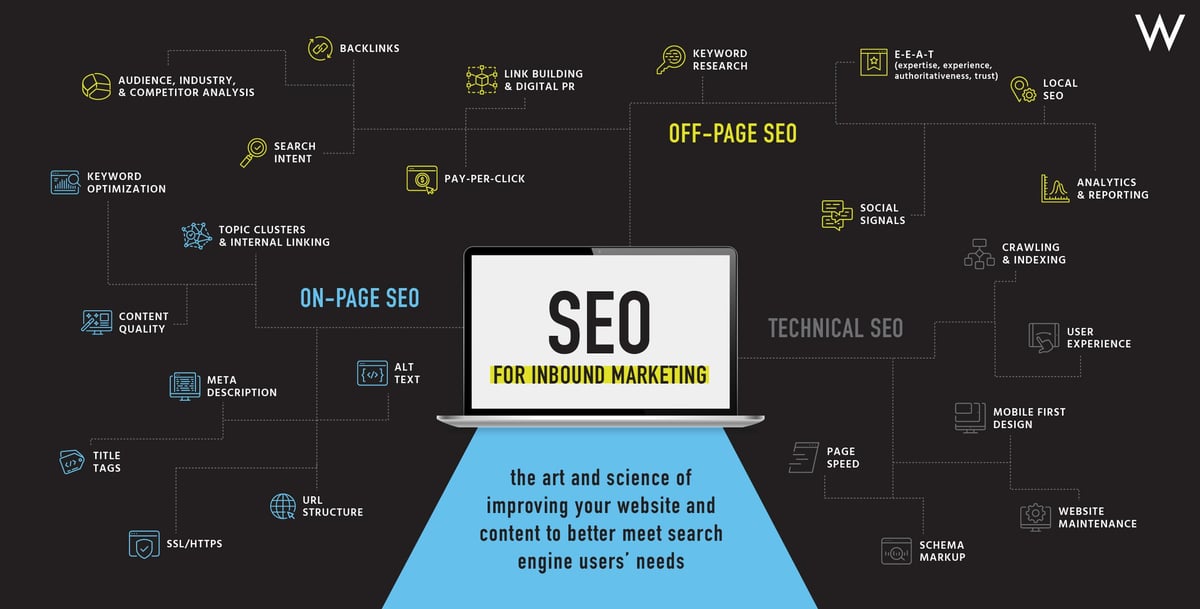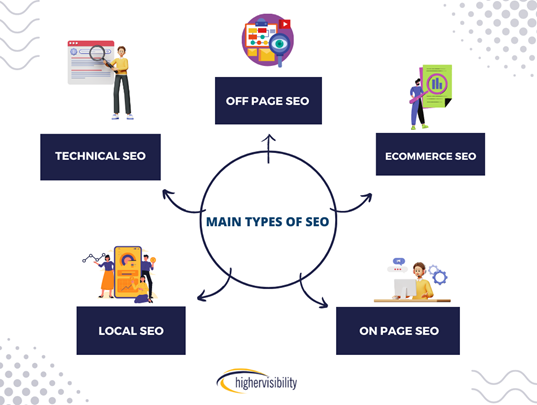Uncover the hidden power of SEO in revolutionizing the financial services industry. Learn the game-changing strategies for success today.

Image courtesy of via DALL-E 3
Table of Contents
- Introduction to SEO in Financial Services
- How Search Engines Work
- Keyword Research for Financial Services
- On-Page SEO for Financial Services
- Off-Page SEO Strategies
- Local SEO for Financial Services
- Content Marketing and SEO
- Monitoring and Improving SEO
- Summary and Wrap-Up
- Frequently Asked Questions (FAQs)
Introduction to SEO in Financial Services
SEO, which stands for Search Engine Optimization, plays a critical role in the realm of Financial Services. This section will delve into the essence of SEO and elucidate why it is indispensable for financial service providers. By defining SEO in simple terms and highlighting the advantages it offers, we aim to shed light on its significance in the financial sector.
What is SEO?
SEO is like a magical code that helps websites appear higher in search engine results, such as Google. It’s all about making sure that when someone searches for something related to financial services, the right websites show up at the top of the list. In other words, SEO makes websites easier to find on the vast internet landscape.
Why SEO Matters in Financial Services
Imagine you have a great financial service to offer, but no one knows about it because your website is buried deep in search engine results. That’s where SEO comes in. By utilizing SEO strategies, financial service providers can reach a wider audience, attract potential clients, and build trust with their target market. Essentially, SEO acts as a beacon that guides people to the valuable services financial institutions have to offer.
How Search Engines Work
In order to understand the importance of SEO in financial services, it’s essential to grasp how search engines operate. Search engines such as Google play a crucial role in how websites are discovered and ranked on the internet.
Crawling and Indexing
Search engines use special bots called crawlers to scour the vast expanse of the internet, looking for websites and gathering information about them. This process is known as crawling. Once a website is discovered, the search engine stores information about it in its index, a massive database of web pages. It’s like having a giant book full of summaries of all the websites on the internet!
Ranking
After a search engine knows about a website, it needs to decide where to place it in the search results when someone types in a query. This decision is based on various factors like the relevance of the content, the quality of information provided, and how trustworthy the website appears to be. Websites that are deemed most useful and informative are ranked higher and shown at the top of search results.
Keyword Research for Financial Services
In order to attract more clients and improve visibility online, financial service providers need to conduct thorough keyword research. This process involves identifying the specific words and phrases potential clients use when searching for financial services on search engines like Google.

Image courtesy of linkdoctor.io via Google Images
What are Keywords?
Keywords are the specific terms or phrases that people type into search engines when looking for information, products, or services. In the context of financial services, keywords could include terms like “financial planner,” “investment advisor,” or “tax preparation services.” By understanding and using relevant keywords, financial service providers can connect with potential clients who are actively seeking their expertise.
Finding the Right Keywords
When selecting keywords for a financial services website, it’s important to choose terms that are not only relevant to the services offered but also have a good search volume. Utilizing tools like Google Keyword Planner or SEMrush can help identify popular keywords in the financial services industry. By prioritizing keywords with high search volumes and low competition, providers can increase their chances of ranking higher in search engine results and attracting more qualified leads.
On-Page SEO for Financial Services
When it comes to optimizing your website for search engines, on-page SEO plays a crucial role in improving your visibility online. In the realm of financial services, utilizing on-page SEO techniques can help you attract more clients and establish trust with your audience. Let’s delve into some key strategies for enhancing your on-page SEO performance.
Using Meta Tags
Meta tags are snippets of text that describe the content of a web page. They provide search engines with information about the webpage’s topic, helping them understand its relevance to users’ search queries. By optimizing your meta tags with relevant keywords and compelling descriptions, you can enhance your website’s visibility in search engine results.
Optimizing Headings
Headings are an essential aspect of on-page SEO as they help structure your content and make it more readable for both users and search engines. By using headings (H1, H2, H3, etc.) to break up your content into sections, you can improve the overall user experience and signal the importance of different topics to search engines. Incorporating relevant keywords into your headings can also boost your chances of ranking higher in search results.
Off-Page SEO Strategies
When it comes to boosting the visibility of a financial services website, off-page SEO strategies play a crucial role. These techniques focus on activities that occur outside of the website itself, such as building backlinks and leveraging social media platforms. By implementing these strategies effectively, financial service providers can enhance their online presence and attract more traffic to their site.

Image courtesy of www.lucamussari.com via Google Images
Building Backlinks
Backlinks are links from other websites that direct users to your site. Search engines like Google consider backlinks as a vote of confidence in your content’s quality and relevance. The more high-quality backlinks your site has, the more authority it is perceived to have, leading to higher search engine rankings.
Financial service providers can acquire backlinks through various methods, such as guest posting on relevant blogs, creating shareable content that naturally attracts links, and reaching out to industry influencers for collaborations. By diversifying the sources of backlinks and focusing on quality over quantity, websites can improve their SEO performance significantly.
Social Media Influence
Social media platforms have become indispensable tools for promoting financial services and engaging with clients. From sharing informative articles to hosting live Q&A sessions, social media allows financial service providers to connect with their audience on a personal level and drive traffic to their websites.
Moreover, social signals, such as likes, shares, and comments, serve as indicators of content relevance and popularity, influencing search engine rankings. By maintaining an active presence on social media channels like Facebook, Twitter, and LinkedIn, financial service providers can boost their SEO efforts and reach a wider audience.
Local SEO for Financial Services
In today’s digital age, it’s essential for financial service providers to leverage local SEO strategies to attract clients in their specific geographical areas. Local SEO focuses on optimizing a website to appear in local search results and on Google Maps, making it easier for potential clients to find and choose your financial services.
Google My Business
One of the foundational steps in local SEO for financial services is setting up and optimizing a Google My Business profile. This free tool allows you to manage how your business appears on Google Search and Maps. By providing accurate and up-to-date information such as your address, phone number, business hours, and services offered, you can increase your visibility to local clients searching for financial services.
Local Listings
In addition to Google My Business, being listed in local directories and maps can further enhance your local SEO efforts. Joining platforms like Yelp, Yellow Pages, and local business associations not only improves your online presence but also helps establish credibility and trust with potential clients. Ensuring consistency across all your listings with accurate information is key to building a strong local SEO foundation for your financial services business.
Content Marketing and SEO
In the world of digital marketing, content marketing and SEO go hand in hand. Let’s delve into how creating valuable content can significantly enhance the search engine optimization (SEO) efforts of financial services.

Image courtesy of www.weidert.com via Google Images
Creating Valuable Content
Creating valuable and informative content is crucial for attracting visitors to your website and improving your SEO ranking. When visitors find your content helpful, they are more likely to stay on your site longer, engage with your services, and even share your content with others. This increased engagement signals to search engines that your website is a reliable source of information, boosting your SEO ranking.
Using Keywords in Content
Keywords play a vital role in content marketing and SEO. By strategically incorporating relevant keywords in your blog posts, articles, and other content, you can improve your website’s visibility on search engine results pages. However, it’s essential to use keywords naturally and avoid keyword stuffing, as search engines prioritize high-quality, relevant content. By focusing on creating valuable content that incorporates the right keywords, you can enhance your SEO strategy and attract more potential clients to your financial services.
Monitoring and Improving SEO
One way to keep track of how well your website is performing in search engine results is by using SEO tools. These tools can provide valuable insights into your website’s traffic, keyword rankings, and overall performance. Some free and user-friendly tools that you can use include Google Analytics, Google Search Console, and Moz. By regularly monitoring these metrics, you can identify areas for improvement and track your progress over time.
Making Constant Improvements
SEO is not a one-time task but an ongoing process that requires constant attention and improvements. To ensure that your website remains competitive in search engine rankings, it’s essential to stay updated with the latest SEO trends and algorithms. Regularly updating your content, optimizing meta tags, and building quality backlinks are some ways to improve your website’s SEO performance. By staying proactive and making continuous improvements, you can optimize your website for better visibility and increased traffic.
Summary and Wrap-Up
In this article, we have explored the critical role of SEO in financial services, understanding how it can help businesses attract more clients and build trust online. Let’s quickly recap the key points discussed.

Image courtesy of www.highervisibility.com via Google Images
Recap of SEO Importance
SEO, or search engine optimization, is essential for financial services to improve their online visibility and reach a wider audience. By implementing good SEO practices, businesses can increase website traffic, attract potential clients, and enhance their overall online presence.
Final Tips
As a final tip, remember to regularly update your website with high-quality, relevant content that incorporates the right keywords. Additionally, building backlinks from reputable sources and engaging with your audience through social media can further boost your SEO efforts. By monitoring your website’s performance using SEO tools and making necessary improvements, you can ensure that your financial services remain competitive in the online space.
Frequently Asked Questions (FAQs)
What is the most important part of SEO?
All parts of SEO play a crucial role in boosting a website’s visibility on search engines. However, two key elements stand out as particularly important: using effective keywords and creating high-quality content. Keywords help search engines understand what your website is about and match it with users’ search queries, while high-quality content engages visitors and enhances your site’s credibility.
How long does it take to see SEO results?
SEO is a long-term strategy that requires patience and consistency. While some changes can lead to immediate improvements, seeing significant results typically takes time. Depending on various factors like the competitiveness of your industry, the current state of your website, and the effectiveness of your SEO efforts, it may take a few months before you notice a noticeable increase in organic traffic and rankings. Remember, the effort you put into SEO will eventually pay off with improved visibility and increased online presence.







